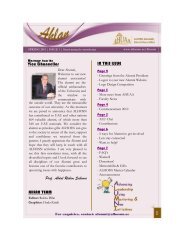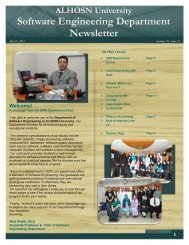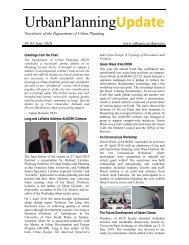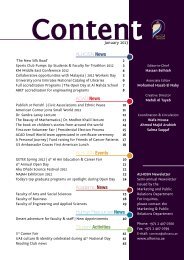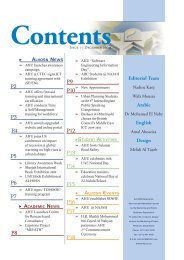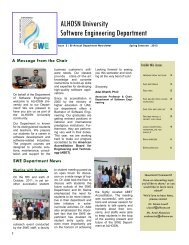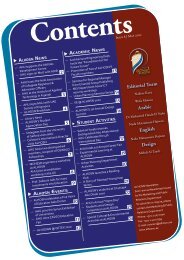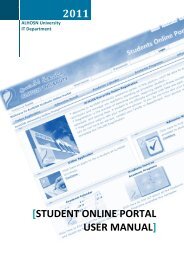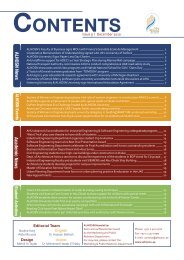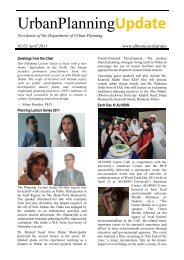ALHOSN University Catalogue Global Knowledge with Local Vision ...
ALHOSN University Catalogue Global Knowledge with Local Vision ...
ALHOSN University Catalogue Global Knowledge with Local Vision ...
Create successful ePaper yourself
Turn your PDF publications into a flip-book with our unique Google optimized e-Paper software.
surveys, case studies, action research, participant observation, focus groups, interviews, and textual analysis.<br />
Additional work on databases and spatial analysis will be included as well.<br />
UPL 205 Urban Ecology (3 = 2 + 1)<br />
Prerequisite: UPL 201<br />
This course will introduce the concepts and principles of basic ecology; the cycling of elements; energetic and<br />
structural organization of major ecological systems; population dynamics; impact of natural resource management<br />
practices and urban and industrial development on the environment; and the incorporation of environmental<br />
quality considerations into development activities. The course focuses mainly on the interface between planning<br />
systems and environmental management using the concept of sustainable development as an integrating<br />
conceptual framework. The evolution of the concept of sustainability is discussed and attention is focused on the<br />
development and use of sustainability indicators, policies for sustainability and the transition to sustainable<br />
development paths. Field study of natural and disturbed ecosystems, urban and applied ecology will be an integral<br />
part of study.<br />
UPL 206 Graphic Communication for Planners (4 = 1 + 3)<br />
Co-requisite: UPL 201, UPL 202<br />
This course teaches students the basics of graphic presentation techniques for planners. The students will learn<br />
the principles of hand-drawing, coloring, map scale, planning-specific graphic symbols, orthographic<br />
projections, and some essential computer skills such as AutoCAD and Photoshop. This course will be<br />
administered in a studio format.<br />
UPL 210: Planning Studio I (4 = 1 + 3)<br />
Prerequisites: UPL 206<br />
This is the first of four planning studios in which students work as teams to complete a large scale project. The<br />
studio topic will correspond to a real-life and ongoing planning problem, and will be situated <strong>with</strong>in an existing<br />
local site. In UPL 210, the students will work on developing a community-level land use plan.<br />
UPL 311 Planning Principles I (Environment and Transportation) (3 = 2 + 1)<br />
Prerequisites: UPL 203, UPL 204<br />
This course is the first half of a two- semester offering in planning principles which introduces four key<br />
functional planning areas: environmental planning and transportation planning, housing, and social planning.<br />
The planning principles courses establish bridges between these areas and comprehensive planning theory and<br />
practice. The UPL 300 course will cover basic environmental and transportation concepts and principles.<br />
UPL 310 Planning Studio II (Land Use Planning) (4 = 1 + 3)<br />
Co-requisite: UPL 300; Prerequisite: UPL 210<br />
This is the second of the program’s four planning studios. UPL 310 will have a similar land-use focus to UPL 210<br />
but <strong>with</strong> added complexity. In the studio, the students will develop a community level land-use plan.<br />
UPL 302 Economic Development (3 = 2 + 1)<br />
Prerequisites: UPL 306, UPL 308<br />
In this course, students will learn the practical application and critical appraisal of regional analysis techniques,<br />
including projection and forecasting, employment and demographic trends, and investment and decision-making<br />
and cost benefit analysis. In addition, the concept and practice of community economic development will also<br />
be introduced as an alternative mechanism for enhancing the long-term growth and development of cities and<br />
regions.<br />
UPL 303 Introduction to Urban Design (3 = 2 + 1)<br />
Prerequisites: UPL 206, UPL 210<br />
This course introduces the role of design in the built environment by focusing on issues of fabric, form, and<br />
typology together <strong>with</strong> character and aesthetic quality. It will also illustrate how an examination of urban design<br />
strategies and the assessment of developments can be applied through a design perspective. Material will cover<br />
historical precedents, but contemporary situations drawn from local and international settings will also be used.<br />
UPL 314 Planning Principles II (Housing and Social Planning) (3 = 2 + 1)<br />
Prerequisites: UPL 300<br />
The Planning Principles II course establishes linkages between the substantive areas of housing and social<br />
planning and comprehensive planning theory and practice.<br />
146



